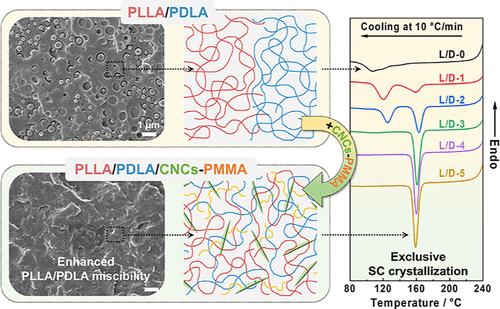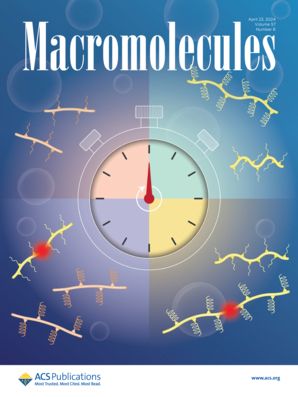Probing into the Selective Nucleation Mechanism of Poly(methyl methacrylate) Modified Cellulose Nanocrystals in Enantiomeric Poly(lactic acid) Blends
IF 5.1
1区 化学
Q1 POLYMER SCIENCE
引用次数: 0
Abstract
Despite the superior performance of stereocomplex crystallites (SCs) formed between poly(l-lactic acid) (PLLA) and poly(d-lactic acid) (PDLA), achieving exclusive SC crystallization based on environmentally friendly strategies remains a challenge. This study systematically investigates the impact of poly(methyl methacrylate) (PMMA)-modified cellulose nanocrystals (CNCs-PMMA) on the crystallization behavior and phase evolution of enantiomeric PLA blends. Experiments demonstrate that CNCs-PMMA acts as an effective nucleating agent for SCs, increasing the nucleation density, crystallinity, and relative fraction of SCs. Exclusive formation of SCs is achieved with the addition of 3 wt % CNCs-PMMA. By comparing the crystallization behavior of PLLA/PDLA/PMMA triple blends, the selective nucleation mechanism of CNCs-PMMA is elucidated. First, the dilution effect of PMMA enriched at the CNCs/PLA matrix interface inhibits homocrystallization, thereby maximizing the thermodynamic advantages of SC crystallization and the inherent nucleating effect of CNCs. Second, the CNC filler network improves the compatibility between PLA enantiomers while also suppressing the phase separation between high-molecular-weight components. Overall, this work reveals the selective nucleation mechanism of polymer-grafted CNCs on SCs and expands the application scope of biomass nanoparticles as multifunctional nanofillers.

求助全文
约1分钟内获得全文
求助全文
来源期刊

Macromolecules
工程技术-高分子科学
CiteScore
9.30
自引率
16.40%
发文量
942
审稿时长
2 months
期刊介绍:
Macromolecules publishes original, fundamental, and impactful research on all aspects of polymer science. Topics of interest include synthesis (e.g., controlled polymerizations, polymerization catalysis, post polymerization modification, new monomer structures and polymer architectures, and polymerization mechanisms/kinetics analysis); phase behavior, thermodynamics, dynamic, and ordering/disordering phenomena (e.g., self-assembly, gelation, crystallization, solution/melt/solid-state characteristics); structure and properties (e.g., mechanical and rheological properties, surface/interfacial characteristics, electronic and transport properties); new state of the art characterization (e.g., spectroscopy, scattering, microscopy, rheology), simulation (e.g., Monte Carlo, molecular dynamics, multi-scale/coarse-grained modeling), and theoretical methods. Renewable/sustainable polymers, polymer networks, responsive polymers, electro-, magneto- and opto-active macromolecules, inorganic polymers, charge-transporting polymers (ion-containing, semiconducting, and conducting), nanostructured polymers, and polymer composites are also of interest. Typical papers published in Macromolecules showcase important and innovative concepts, experimental methods/observations, and theoretical/computational approaches that demonstrate a fundamental advance in the understanding of polymers.
 求助内容:
求助内容: 应助结果提醒方式:
应助结果提醒方式:


